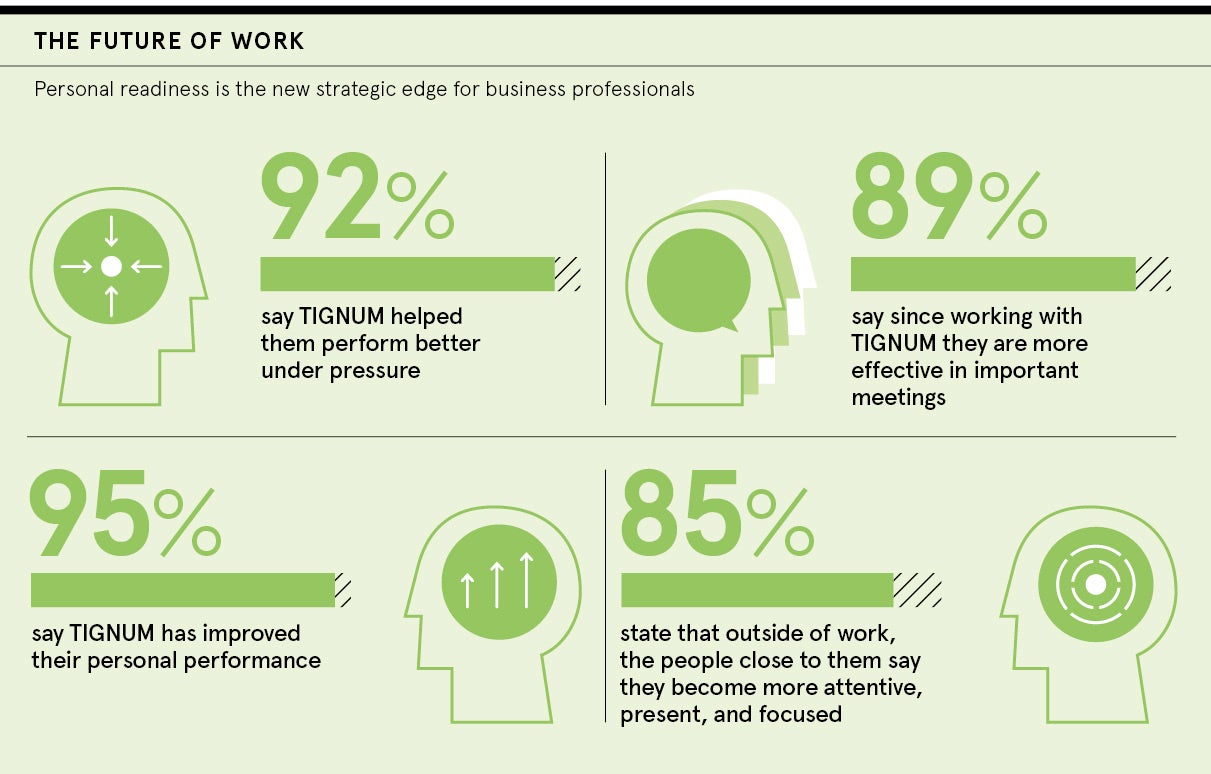The companies that succeed in the future of work will be those that upgrade their performance culture and equip teams with the tools to tackle daily challenges. In this tough business environment, only employees with a new level of personal readiness can succeed and create the massive positive impact required.
There is no doubt the shift to remote working has been a long time coming, but the coronavirus pandemic accelerated it in a brute-force way that exposed the cracks in the system. Productivity in many companies may have increased, yet forced remote working has revealed cultural and collaborative weaknesses within teams and placed new kinds of strains on our lives.
When the pandemic first sent countries into lockdown, energy levels went up, according to analysis by international human performance firm TIGNUM. However, it soon became apparent that people were running on adrenaline, buoyed by the natural energising effect caused by rallying around a common crisis.

After the long-term reality of the pandemic hit home, TIGNUM found fatigue started accumulating. Although people were not travelling, had no jet lag, slept in their own beds and for an average of 45 minutes more each day, they felt exhausted and more fatigued.
“We have seen a huge redistribution of fatigue from mostly physical to predominantly emotional and cognitive,” says Scott Peltin, founder and chief performance officer at TIGNUM. “People have been dealing with uncertainty and fear. They are trying to be perfect at both home and work, while forced to be only at home and fully on at all times, transfixed to their camera in video conference meetings. All of this while trying to be collaborative, empathetic, creative problem-solvers.”
From a brain science perspective, the shift has had a huge toll on performance. Fatigue has caused people to double down on their biases, seek quick fixes to complex problems and default back to some of the most disruptive parts of their behavioural style. Competitive people become pushy, extroverted people become overly chatty and analytical people become paralysed without data, according to TIGNUM.
In a remote environment, it is more difficult for leaders to show they authentically care for their teams. Initially, this was done through virtual coffee breaks, an onslaught of video meetings and emotional micro-managing. Though a well-intended natural response by leaders, it contributed to the already high levels of cognitive fatigue, feelings of guilt for not being perfect and a sense of unfairness due to discrepancies around how the pandemic has impacted people.
From 15 years of working with prominent C-suite and other leadership teams, TIGNUM has developed a unique understanding of the business professional’s body and brain. “Great leaders, great teams and great companies know great work requires energy, mental agility, resilience and adaptability. Our research indicates these critical elements are deficient in too many teams,” says Peltin.
TIGNUM’s data points to the need for different types of mindset and recovery strategies at different times to match the specific daily demands. To prepare clients for their different challenges, TIGNUM built TIGNUM X, an effective and cutting-edge Sustainable Human Performance ToolBox. With more than 55 science-based strategies, TIGNUM X shifts leaders and their teams from being exhausted to energised, overwhelmed to in control, and fragile to resilient.
The pace at which companies need to adapt to challenges will not slow down in the years ahead, amplifying the need for sustainable human performance. If the future of work is hybrid, as many companies are planning for, an agile toolbox is essential.
“We’re living in a world of constant change, high load and extreme uncertainty,” says Peltin. “Without the right tools, it’s easy to feel out of control, overwhelmed, fatigued, scattered and brain fogged. People can come out of this crisis stronger, more skilled and better tooled to deal with complexity and challenges.”
For more information please visit tignum.com
Sponsored by
The companies that succeed in the future of work will be those that upgrade their performance culture and equip teams with the tools to tackle daily challenges. In this tough business environment, only employees with a new level of personal readiness can succeed and create the massive positive impact required.
There is no doubt the shift to remote working has been a long time coming, but the coronavirus pandemic accelerated it in a brute-force way that exposed the cracks in the system. Productivity in many companies may have increased, yet forced remote working has revealed cultural and collaborative weaknesses within teams and placed new kinds of strains on our lives.
When the pandemic first sent countries into lockdown, energy levels went up, according to analysis by international human performance firm TIGNUM. However, it soon became apparent that people were running on adrenaline, buoyed by the natural energising effect caused by rallying around a common crisis.


